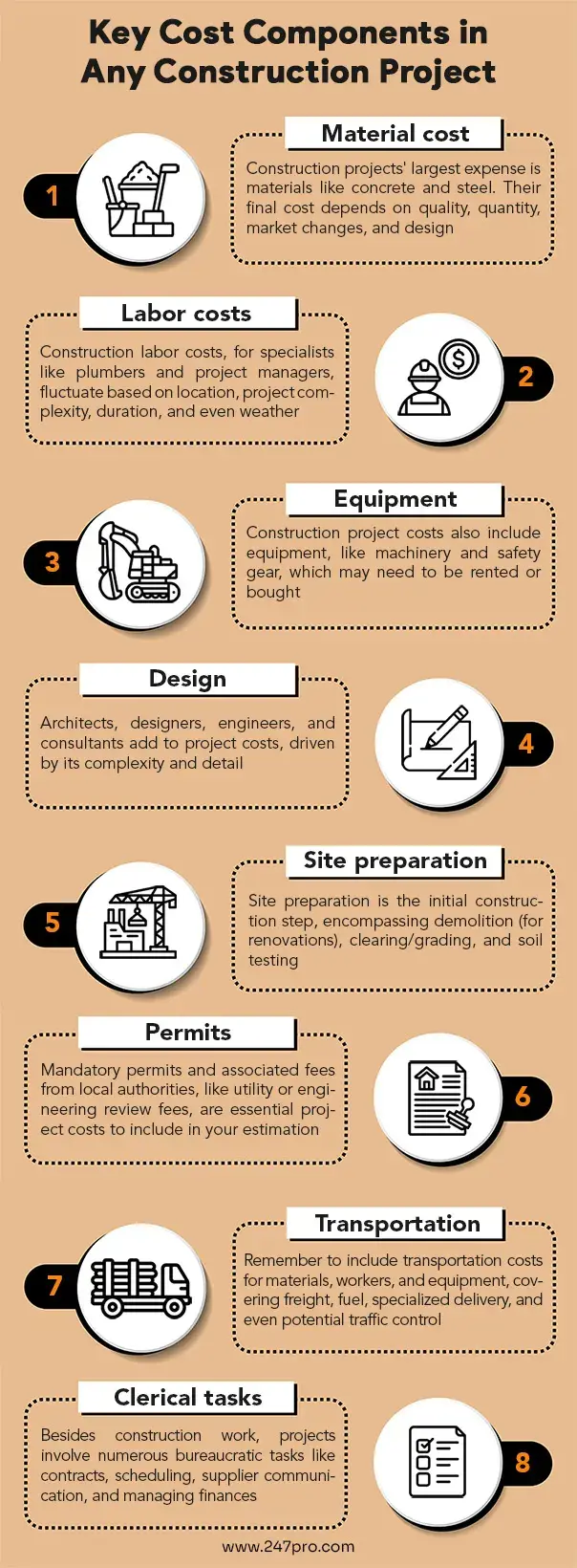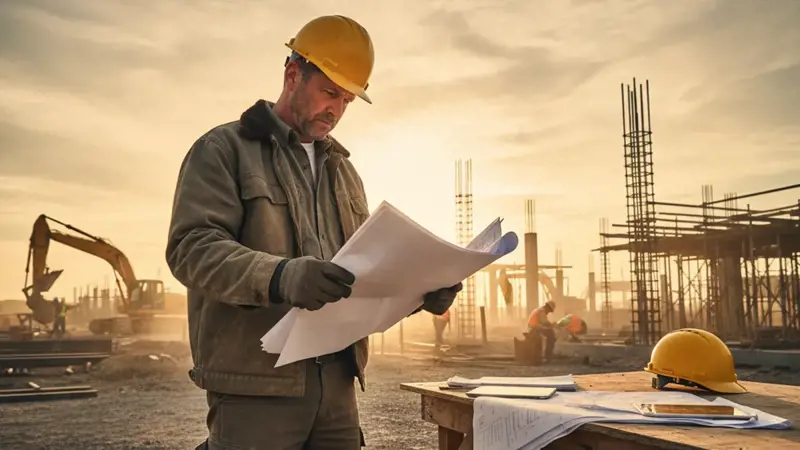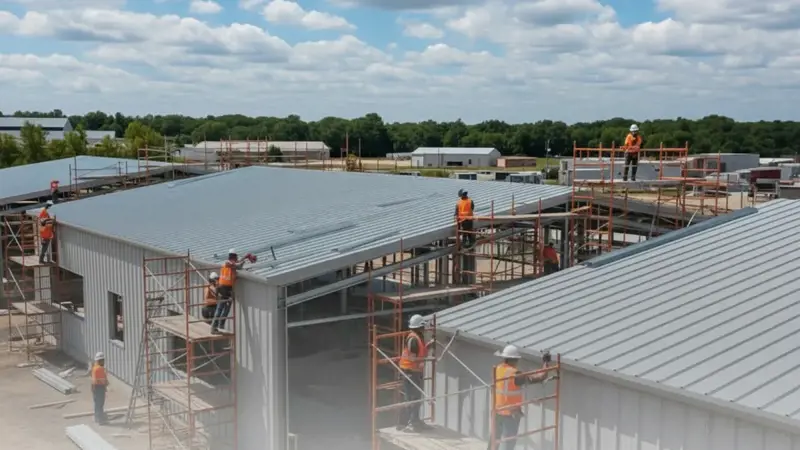Construction cost estimation is a pre-construction activity that helps you understand all the required costs for building a new structure or renovating part of it. This estimation includes calculating the exact costs of materials, labor, equipment, transportation, and permits.
Proper estimation is crucial for owners and contractors to determine whether a project is feasible or not. For example, only by using a precise remodel house cost estimator can an owner understand whether the budget aligns with the upcoming costs or not.
The Foundation of Success: Why Accurate Construction Cost Estimation is Non-Negotiable?
Starting a construction project without a pre construction cost estimate is like embarking on a long road trip without knowing how much gas you will need. Both owners and contractors will need a proper construction cost estimator for their project; otherwise, they can not move their project forward. From building a structure from scratch to basement renovation, using accurate cost calculators to estimate the costs of the construction is the driving force of a successful project.
For homeowners, the biggest challenge in any construction project is not knowing the cost of the work; having a precise estimate allows them to make informed decisions, set a budget, and avoid compromising later.
Additionally, having a clear vision of the total project costs will help homeowners make informed choices regarding materials, designs, and additional features that align with their budget limits. Another merit of knowing what you will be struggling with is that, for instance, in a renovation project, you can compare the bids that contractors provide with your building renovation cost calculator and decide whether to proceed with it or not. So, in short, having an accurate construction cost estimation will help homeowners in the following ways:
- Eliminating the fear of the unknown cost
- Trusted decision-making
- Trust and transparency
Construction cost estimation and calculations can also benefit contractors in preparing bids that are both competitive and profitable. In a competitive market like construction, accurate estimation will equip you with the knowledge that will get you any job. In a no-pre-estimation situation, you might underestimate the cost of a building or renovation project; as a result, you might need to cut into your pocket to cover the costs of the project. On the other hand, if you overestimate the costs, you may submit a bid that is too high, and you will likely lose the project to other contractors who have submitted a more realistic bid. Estimating the accurate costs of the project will help the contractor with:
- Offering a winning bid
- Operating efficiently
- Building strong client relationships
- Having a sustainable and profitable business
Whether you are a homeowner seeking a building renovation to start your project or a contractor struggling to prepare a winning bid, having a precise estimation of the cost will be a huge plus for you. Remember that it's not just an option; it's a non-negotiable decision for achieving success.

Deconstructing the Build: Key Cost Components in Any Construction Project
If you are still on the fence about why you should use a construction building estimator or building renovation cost calculator, let’s break down the components that contribute to the total cost. In this way, you will know what you will estimate. Any construction project, from a simple basement renovation to a whole-house building, consists of universal cost components. Understanding them is crucial for both homeowners and contractors before starting a project.
- Material cost: Generally, a construction project requires materials such as concrete, steel, roofing, flooring, insulation, plumbing fixtures, and electrical wiring. Materials often account for the largest portion of your budget. However, some factors will determine the actual cost, like the quality and quantity of them, market fluctuations, and specific designs.
- Labor costs: a construction project will need many specialists like plumbers, electricians, masons, roofers, painters, laborers, project managers, and supervisors. But the cost is not always the same. The labor cost can vary depending on different factors:
- Location: Labor rates usually vary significantly by region and state.
- Complexity: The more complex the project, the more specialized labor will be needed
- Project duration: The longer the project takes, the more it will cost
- Time of construction: Sometimes, harsh weather conditions might add to the final cost.
- Equipment: In addition to the cost of materials, you must pay for the equipment that is needed, like machinery, scaffolding, safety equipment, and other consumable equipment; sometimes, you may need to rent or buy this equipment.
- Design: There are costs for architects, interior designers, structural and civil engineers, and specialized consultants. The complexity and level of detail of the project can dictate the final cost.
- Construction site preparation: Site preparation is one of the first tasks that needs to be done before constructing. This process includes
- Demolishing of the already existing structure, mainly for renovation
- Clearing and Grading
- Soil testing
- Permits: There are some mandatory permits that you need to get from local authorities, like utility connection fees, impact fees, or engineering review fees. These permits are a must for any project, so you have to consider them in your estimation.
- Transportation: transporting material, workers, and equipment must also be considered. This includes freight cost, fuel, specialized delivery for heavy items, and even sometimes a fee for traffic control during delivery.
- Clerical tasks: in addition to construction workers, there are many bureaucratic processes that you need to take care of; for example, you have to prepare contracts, create a schedule, communicate with suppliers, manage accounting and taxes, and many other similar tasks.
From Concept to Contract: Methods and Tools for Construction Cost Estimation
Estimating your construction cost isn’t just a one-time process; it begins with a simple idea and culminates in a precise plan that is applicable. Whether you're a homeowner or a contractor, in this process, you need to know what materials to use, whom to consult with, and which methods to employ.
There are different methods to use as a building or renovating cost calculator at each stage of the job, from the initial idea to the final stage, which involves preparing a bid. You will need to use different tools and methods in each method.
The "Back-of-the-Napkin" Stage
This is the earliest phase in cost estimating, where you have only a general idea of the building or renovation. These methods help you have a general idea of the budget you need. The number you will get is not the accurate one, but a quick feasibility check. You have three ways to do this:
- Square Footage Method: You take the approximate square footage of the building you have in mind and multiply it by the average cost per square foot for a similar building
- Unit cost: for some buildings, like warehouses, you can estimate based on capacity or per functional unit
- Historical comparison: You can use the data from previous similar projects, especially as a contractor, and adjust them to your current project to get the approximate cost.
Numerous tools can assist you with this method; for example, you can use 247pro’s building renovation cost calculator or building cost estimator to obtain the necessary data. You simply use spreadsheets and rules of thumb for this purpose.
Preliminary/Schematic Design Estimation
As the project progresses from a general concept, you will need a more defined schematic design with basic information, such as sizes and preferred materials. At this stage, you will become familiar with the project's basic components. In this stage, you can use
- Assembly Method: Instead of calculating total square footage, break down the project into major assemblies, such as calculating the cost and characteristics of the foundation and framing. Roof and walls separately. For example, a deep concrete foundation and an asphalt shingle roof
Use more detailed spreadsheets and get non-binding quotes from suppliers. You can also use an online calculator, such as our whole-house renovation cost calculator, to get there easily.
Detailed Estimation
This is the most precise level of estimation and is typically performed when the project design is nearly complete. In this stage, the derailed structural plan has been detailed with explicit specifications. Here you will have an accurate estimate for your construction project.
Use:
- Quantity takeoff: quantify every single material that you need for your project and multiply it by the unit cost
- Gather bids from subcontractors for various specialized tasks.
- First-Principles Estimating: This is for unique and customized items that don’t fit standard procedures. Here, you need to calculate the exact material, labor, equipment, and design costs related to the task.
Compare and contrast different databases and bids, and utilize a specialized online estimating tool, such as our building renovation cost calculator, to obtain the exact number you need for your project.
As a contractor, after you understand the costs associated with a renovation or building project, you can prepare a bid that guarantees your benefit, as it is competitive, risk-adjusted, and profitable.
Navigating the Variables: Factors Influencing Construction Costs
Typically, construction costs vary for even two identical buildings in different locations. Several factors can significantly impact the final cost. Understanding these variables will help both homeowners and contractors eliminate financial risk, manage projects effectively, and make their renovation or building estimates more reliable.
These factors fall into two categories: external factors that you have little control over and internal factors that are within the project manager’s contr
External Factors
These are economic, environmental, and sometimes global forces that can influence the project cost.
- Geographic Location: Construction costs usually differ from one region, state, and city to another. This is mainly due to various labor costs, material prices, transportation distance, and local permit fees and taxes. So, what is the solution? Get the most precise estimate by entering your zip code on 247pro’s estimator to determine the cost based on your exact location.
- Market Conditions & Economic Climate: Economic drivers, such as inflation, supply chain disruptions, and high demand for construction services, can cause inconsistencies in prices. For homeowners and contractors, it is essential to anticipate economic shifts that can impact prices and seek more affordable materials and equipment.
- Global Market Prices: The cost of materials can fluctuate due to factors such as international availability, the price of raw materials like iron ore, and energy costs. These factors are often unpredictable
Internal Factors
Unlike external factors that you cannot change or sometimes predict, internal factors can often be managed. These factors primarily relate to the customization of the project.
- Design Complexity: The more complex the project, the higher its cost will be due to customized design, increased labor, and material costs. Unlike customized elements, such as specialized architectural details, a standard and straightforward design is often more cost-effective.
- Material Choices: Materials typically consume the largest portion of your budget. The quality and the type of material you choose can make a huge difference in your project’s cost.
- Choosing Subcontractors: It is essential to recognize that cheaper bids may seem tempting, but they do not necessarily guarantee the desired quality of projects. Inexperienced workers, delays, and material waste can go over your budget. So, do not choose a bid that is lower than others; look for reviews of past works and examine them carefully. Sometimes, paying more for an experienced contractor can guarantee that the project will proceed according to the budget.
How to Estimate New Home Construction Costs
The process of estimating the cost of a new home begins with a rough concept and ends with a comprehensive, feasible plan.
- Initial Feasibility Check: Before commencing any design work, a conceptual estimate can assess the viability of a project. The "back-of-the-napkin" method computes the approximate square footage of the planned home by multiplying it by the average cost per square foot of a comparable construction in your area. For the homeowner, this approach offers a quick and simple budget range.
- Detailed Breakdown: To produce an accurate budget, a thorough estimation must be carried out after the project's design is almost finished. This type of cost calculation is the most precise and requires a careful quantity takeoff in which every material is quantified. Subcontractors' verified bids for specialized jobs like electrical, plumbing, and roofing are then used to price this list based on current market rates.
- Final Cost Components: The final estimate needs to be a thorough document that covers more than just labor and materials. It should include all project-related costs:

How to Make an Estimate for House Construction
Whether you are a homeowner or a contractor, a reasonable estimate is built on a foundation of detailed information and a clear understanding of the project's scope.
- Define the Scope: Before you can estimate costs, you need a clear project scope. What are the client's expectations? What is the project's function and design? Are there any special legal or regulatory requirements? A thorough site visit is often necessary to understand the unique conditions of the location.
- Quantity Takeoff: This phase is crucial, so you need to create a detailed list of every single material and component needed for the project. For instance, the list should include not only "roofing materials" but also the precise quantity of shingles, rolls of underlayment, nails, and other essential items.
- Gather Pricing: After completing your quantity takeoff, you need to obtain pricing for each item. This involves reaching out to suppliers, vendors, and subcontractors for quotes. It's essential to be mindful that these quotes can have a limited lifespan and may change due to market conditions.
- Factor in All Costs: The final estimate must include more than just materials and labor. It should account for:
- Direct Costs: All costs directly related to the project, such as materials and labor wages.
- Indirect Costs (Overhead): Non-direct costs that support the project, like office expenses, insurance, and the cost of preparing bids.
- Profit and Contingency: A healthy profit margin for the contractor and a contingency fund to manage risks.
How to Estimate Remodel Costs
The estimation process for remodeling is very similar to estimating a new construction, with a few special considerations.
- Examine the Current Structure: A significant factor is the home's current condition. The cost of renovating an older home that needs structural work or extensive repairs will be higher than that of a newer one that only requires cosmetic updates.
- Renovation Scope: The cost of a renovation increases with its scope. A complete house structural renovation is on a different scale than remodeling a single bathroom.
- Demolition and Deconstruction: Demolition is a common component of remodeling projects, which raises the expense of disposing of and removing debris.
- Hidden Costs: Expect the unexpected. The final cost could rise if you open up walls and find unexpected problems that need to be resolved, such as old wiring, plumbing issues, or water damage.
- The quality of finishes, such as cabinets, countertops, and flooring, can significantly impact the budget. Standard, off-the-shelf options will be substantially less expensive than high-end, custom materials.
How Much Does It Cost to Build a Container Home?
Building a home out of containers is becoming increasingly common, as it's believed to be cheaper than traditional building methods. The cost to build a container home, however, can differ significantly.
- Cost Range: A container home can be as cheap as a basic studio or as expensive as a multi-container complex with premium finishes. Larger, luxurious homes can cost over $100,000, while basic homes can cost between $10,000 and $35,000.
- Cost-raising Factors: Although the original container could be affordable, several factors can raise the final cost considerably:
- Foundation and Site Preparation: Just like any other house, a container home requires a prepared site and a strong foundation.
- Utilities and Insulation: To make the container livable, it must be retrofitted with adequate insulation, and all utilities (sewer, electrical, and water) must be connected.
- Customization: Cutting openings for windows and doors requires a lot of work and welding. Additionally, a custom design with several containers will cost significantly more than a unit with just one container.
- Appliances and Finishes: Just like in a traditional home, the price of appliances, cabinetry, flooring, and interior finishes can vary greatly.
Beyond the Estimate: Project Management & Cost Control for On-Budget Construction
Getting an accurate estimate is just the start of your project. The most important thing, however, is to stick to the estimated budget and manage it carefully; otherwise, the cost of building or renovating will exceed your project's budget.
So, project management and cost control are some of the most powerful tools that will ensure your project stays on track and within budget. Cost management will benefit both homeowners and contractors and avoid any unexpected financial risk.
For both the contractor and the homeowners, project management includes:
- Continuous Monitoring: This involves constantly examining the project’s different aspects, like labor and material costs, to see if they are against the estimated budget. Significant deviations must be immediately investigated.
- Change Order Management: Sometimes changes are inevitable in construction projects. You need to manage these changes in a way that your estimated price does not change significantly. As a contractor, you should inform the clients about the change and ask for their approval.
- Material Management: You need to continually look for the best suppliers and manage material delivery to avoid any delay on the project and avoid additional storage costs. Proper and on-time delivery can reduce off-budget costs.
- Labor Productivity Management: Tracking labor productivity can help you detect any issues in the project, such as equipment breakdowns or skill gaps that can increase labor costs. Don't forget that efficient work means your project finishes faster and within the budget.
- Partnering with Professionals: To ensure that the project will be conducted perfectly, you can get professional advice from construction project management firms. These firms are specialized in examining and estimating the accurate costs for complex projects.


